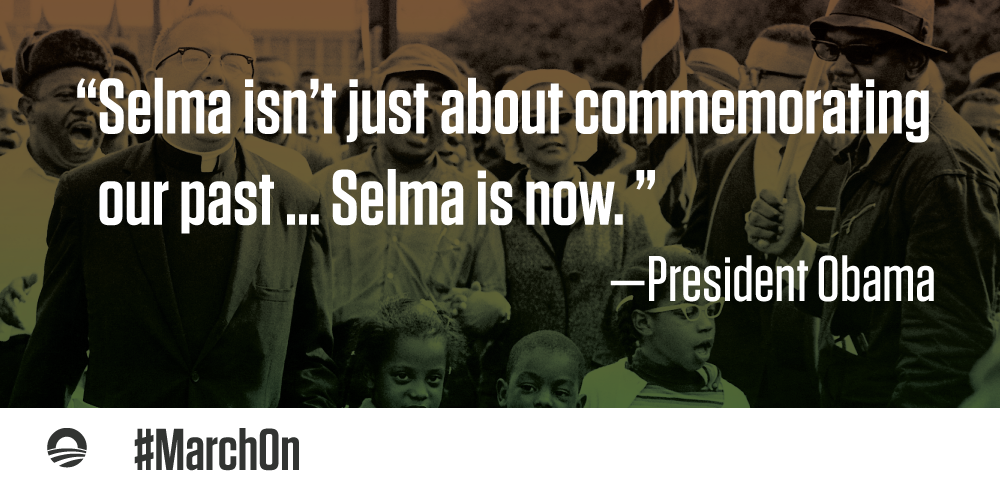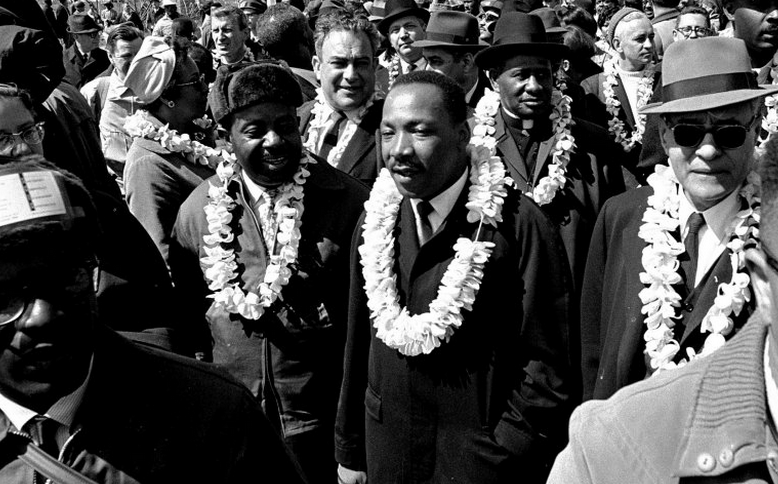UPDATED: The president’s speech :
Rep. Terri Sewell at 1:59:20
Rep. John Lewis at 2:04:00
President Obama at 2:12:00Transcript: Remarks by the President at the 50th Anniversary of the Selma to Montgomery Marches
Today, CSPAN-3 will cover the commemoration of Bloody Sunday live at 12 noon Eastern Time.
Six hundred marchers assembled in Selma on Sunday, March 7, and, led by John Lewis and other SNCC and SCLC activists, crossed the Edmund Pettus Bridge over the Alabama River en route to Montgomery. Just short of the bridge, they found their way blocked by Alabama State troopers and local police who ordered them to turn around. When the protesters refused, the officers shot teargas and waded into the crowd, beating the nonviolent protesters with billy clubs and ultimately hospitalizing over fifty people.
President Obama on this weeks events:
“When I take Malia and Sasha down with Michelle next week, down to Selma, part of what I’m hoping to do is to remind them of their own obligations. Because there are going to be marches for them to march, and struggles for them to fight”
There are many stories about the march, few as imbued with symbolism as this one Tweeted by @splcenter: The Untold Story of Why MLK Wore a Hawaiian Lei at Selma
Bright Hawaiian lei will be on full display this weekend when President Barack Obama, civil rights icon Rep. John Lewis and others march across the Edmund Pettus Bridge in Selma to mark the anniversary of the civil rights protests.[…]In photos of the 54-mile third march from Selma to Montgomery on March 21, 1965, Martin Luther King, John Lewis and other demonstrators can be seen wearing the iconic Hawaiian flower garlands.
The journey of those flowers from Hawaii to Alabama started a year earlier, when King delivered a lecture at the University of Hawaii. It was there that he met Rev. Abraham Akaka, the brother of future U.S. Sen. Daniel Akaka.
In the lead-up to the third march, as President Lyndon Johnson was making preparations to protect the demonstrators with military policemen and the Alabama National Guard, Rev. Akaka sent gifts of bright white lei from the Pacific Ocean to the Deep South to be draped on the marchers.
For the reverend, it was a symbolic gesture that affirmed Asian-American support for the civil rights movement.
Now, 50 years later, Lewis and Hawaii native Obama will join Asian-American lawmakers Sen. Mazie Hirono and Rep. Mark Takai, among nearly 100 lawmakers, to pay homage to the civil rights movement and “Bloody Sunday.”
The first black president, born in Hawaii, will be wearing a lei to honor the civil rights movement.
This past week, lawmakers have been visiting Selma and the recording their thoughts and impressions about the event today.
Rep. Keith Ellison @keithellison
When John Lewis began March from Selma to Montgomery, he had in his backpack, apple, toothbrush, journal, book
The National Journal published 20 photos of the march:
During the first Selma-to-Montgomery march, 600 civil rights demonstrators were attacked by local and state police. The attack bolstered support for the movement, and the demonstrations that followed eventually led to the Voting Rights Act.
.
50 years later, voting rights are still under attack:
Tens of thousands of people-including President Obama-will travel to Selma this weekend to commemorate the fiftieth anniversary of “Bloody Sunday,” the infamous march that led to the passage of the Voting Rights Act.
The progress since then has been remarkable. Because of the VRA, the number of black, Hispanic and Asian officeholders has skyrocketed from under 1,000 in 1965 to over 17,000 today. “African-Americans went from holding fewer than 1,000 elected offices nationwide to over 10,000,” according to a new report from the Joint Center for Political and Economic Studies, “Latinos from a small number of offices to over 6,000, and Asian Americans from under a hundred documented cases to almost 1,000.” In Alabama, the birthplace of the VRA, the number of black elected officials has increased from eighty-six in 1970 to 757 today.[…]
Despite these dramatic improvements, the right to vote is currently under the most sustained attack since the passage of the VRA.
In 2011 and 2012, 180 new voting restrictions were introduced in forty-one states, with new laws adopted in nineteen states that made it harder to vote, according to the Brennan Center for Justice. Many of these laws were blocked in court in 2012, but a year later the Supreme Court gutted the VRA, dealing a devastating blow to voting rights. As a result, twenty-one states had new restrictions in place in 2014.
This trend is getting worse in 2015. In the first few weeks of this year, forty new voting restrictions were introduced in seventeen states. That number will grow as state legislatures consider proposed legislation. Nevada, New Mexico and Missouri are among the states moving to pass voter-ID laws. “It’s surprising and remarkable that in 2015 we’re fighting over the same thing we fought over 50 years ago-the right to vote,” says Wendy Weiser of the Brennan Center. […]
The Selma anniversary offers lawmakers a prime opportunity to move from symbolism to substance. Congresswoman Terri Sewell of Selma recently told me: “My hope is that the bipartisan efforts we’ve made will move people to recommit themselves to restore the teeth back into the Voting Rights Act. Gold medals are great-I think it’s long overdue and much deserved that the foot soldiers are going to finally get their place in history, but the biggest tribute that we can give to those foot soldiers is fully restoring the Voting Rights Act.”





45 comments